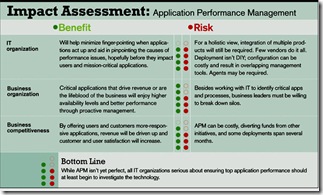Be Cautious about APM Discovery Agents
I was reading a recent article from InformationWeek about APM and it had concerned me a little bit. The article was titled "Performance Anxiety" and meant to address APM product vendors. For whatever reason, Microsoft's product line was not included.
I am still trying to determine the intentions of the article. It was not clear. However what was clear was the suggestion that in order to be successful at APM server agents are necessary.
Be very careful with assumptions like this. Application Discovery Agents are NOT the key here.
This is not to say the article was bad, but that it implies and talk a lot about agents when there are many other facets to APM. I do like the diagram below on the APM risk analysis.
Source: Information Week APM Performance Anxiety
Let me tell a story from my In my previous life. I was a key resource in the vendor selection and architecture processes for selecting our vendor for APM. We choose one of the big stack IT Management Suites that addressed APM and PPM.
The promise of monitors for the application space became very problematic. We did find that for Service Management (MOF or ITIL processes) that there are some very useful monitors for networks and physical servers. The problem with the application space was that it turned into a HUGE development effort or minimal return. Application monitoring was quickly disbanded.
Until the Application Monitoring further matures I would suggest not to go down this road yet. There is still a great deal of maturing that needs to happen. InformationWeek's analysis shows this as well.
Instead of focusing on those aspects I would have you consider how APM effects your Enterprise Architecture processes around Technology Life Cycles. Below is a common, but simple grid that is used for basic analysis on what application architectures you should retire, spend less time on, embrace or empower.
Tags: Enterprise Architecture APM


